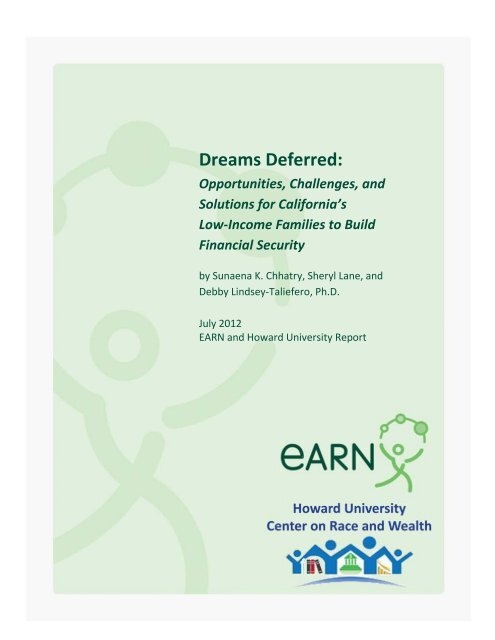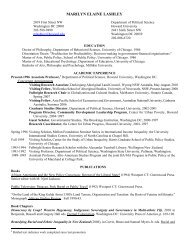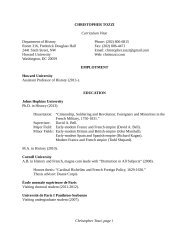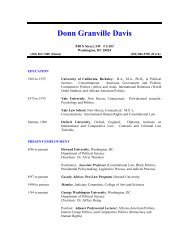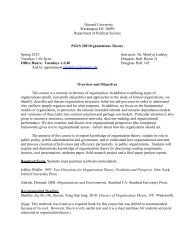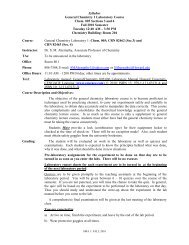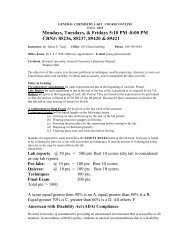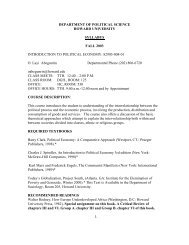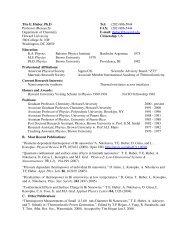Dreams Deferred: - COAS - Howard University
Dreams Deferred: - COAS - Howard University
Dreams Deferred: - COAS - Howard University
Create successful ePaper yourself
Turn your PDF publications into a flip-book with our unique Google optimized e-Paper software.
<strong>Dreams</strong> <strong>Deferred</strong>:<br />
Opportunities, Challenges, and<br />
Solutions for California’s<br />
Low-Income Families to Build<br />
Financial Security<br />
by Sunaena K. Chhatry, Sheryl Lane, and<br />
Debby Lindsey-Taliefero, Ph.D.<br />
July 2012<br />
EARN and <strong>Howard</strong> <strong>University</strong> Report
July 2012<br />
<strong>Dreams</strong> <strong>Deferred</strong>: Opportunities, Challenges, and Solutions for California’s<br />
Low-Income Families to Build Financial Security<br />
ACKNOWLEDGEMENTS<br />
FUNDING SUPPORT<br />
EARN’s grassroots constituency building and statewide listening sessions work throughout<br />
California has been made possible with generous funding from the Ford Foundation. We are<br />
especially grateful to Kilolo Kijakazi, Program Officer at the Financial Assets and Economic<br />
Security Unit, for her leadership and commitment to creating wealth-building opportunities for<br />
families through the country.<br />
EARN’s grassroots constituency building work is part of a larger Ford Foundation initiative called,<br />
Building Economic Security Over a Lifetime (BESOL), which works to promote social protection<br />
programs that help low-income families achieve economic stability. Through this initiative, a<br />
number of organizations are also conducting listening sessions and building public support in<br />
their respective states for policies that expand opportunities for families to save and build<br />
economic security.<br />
RESEARCH PARTNER<br />
Professor Debby Lindsey-Taliefero from <strong>Howard</strong> <strong>University</strong>’s Center on Race and Wealth<br />
assisted EARN with synthesizing and analyzing the data collected in the statewide listening<br />
sessions. Professor Lindsey-Taliefero’s research team includes Adji Diagne and Bintou Lingani.<br />
LISTENING SESSION PARTNER ORGANIZATIONS<br />
EARN<br />
Families in Schools<br />
The Greenlining Institute<br />
Long Beach Interfaith Community Organizations<br />
PICO Federations of the Central Valley (Congregations Building Community in Modesto,<br />
Merced Organizing Project, and People and Congregations Together)<br />
CONTRACTED DATA AND MAPS CREATION<br />
Erika Lindsey, Urban Planner, Independent Consultant<br />
© 2012 EARN www.earn.org
July 2012<br />
<strong>Dreams</strong> <strong>Deferred</strong>: Opportunities, Challenges, and Solutions for California’s<br />
Low-Income Families to Build Financial Security<br />
TABLE OF CONTENTS<br />
Executive Summary ...................................................................................................... i<br />
Section 1: Introduction................................................................................................. 1<br />
The History of Wealth Building in the United States………………………………………………. 2<br />
The Need for Equitable Wealth Building…………………………………………………………………. 2<br />
Section 2: The Solution: Build and Mobilize a Grassroots Constituency…..……………. 4<br />
Listening Session Scope…………………………………………………………………………………… ........ 5<br />
Data Collected from the Statewide Listening Sessions…………………………………………… . 5<br />
Section 3: Key Findings………………………………………………………………………………………….… 8<br />
Participants’ <strong>Dreams</strong> and Goals………………………………………………………………………………. 8<br />
Challenges to Financial Prosperity…………………………………………………………… .............. 10<br />
Deeply Felt Issues and Themes……………………………………………………………………… ....... 13<br />
Themes Unique to Specific Groups……………………………………………………………………… .. 15<br />
Participants’ Ideas for Removing Barriers to Financial Security ................................. 16<br />
Section 4: Recommendations .................................................................................... 19<br />
Improve Access to High Quality Financial Services and Products .............................. 20<br />
Increase Access to Higher Education.......................................................................... 20<br />
Other Policies that Promote Long-Term Financial Security ....................................... 21<br />
Section 5: Where Do We Go From Here .................................................................. 23<br />
Appendix A: Characteristics of Participants ............................................................. 27<br />
Appendix B: Maps of Participants in the California Listening Sessions ................... 39<br />
Notes ........................................................................................................................... 47<br />
© 2012 EARN www.earn.org P.2
July 2012<br />
<strong>Dreams</strong> <strong>Deferred</strong>: Opportunities, Challenges, and Solutions for California’s<br />
Low-Income Families to Build Financial Security<br />
<strong>Dreams</strong> <strong>Deferred</strong>:<br />
Opportunities, Challenges, and Solutions for California’s<br />
Low-Income Families to Build Financial Security<br />
by Sunaena K. Chhatry, Sheryl Lane, and Debby Lindsey-Taliefero, Ph.D.<br />
July 2012<br />
EXECUTIVE SUMMARY<br />
The opportunity to build a better future for your family is at the heart of the American Dream.<br />
For generations, families have viewed homeownership, a quality education, a job that pays well,<br />
and business ownership as ways to move up the economic ladder and build financial security.<br />
Today, many families feel this core promise – that hard work and sacrifice will lead to a better<br />
future – is fundamentally broken. Especially for low-income households, the Great Recession<br />
that began in 2007 ushered in an era of shrinking opportunities, erosion of household wealth,<br />
and downward economic mobility.<br />
EARN, a nonprofit organization, realized that the voices of low-income families were absent<br />
from policy debates about economic recovery. For the overall health of a state the size of<br />
California, it is vital to ensure that the interests of some of the most vulnerable populations –<br />
low-income communities and communities of color – are not being left behind. Given the scale<br />
of problems in California, and because of the sheer complexity of the state’s political and<br />
economic landscape, this requires an energized and engaged grassroots constituency that can<br />
influence political decision-making.<br />
EARN partnered with the following six community-based organizations located throughout the<br />
State of California: Families in Schools, the Greenlining Institute and members of its coalition,<br />
Long Beach Interfaith Community Organization (ICO), and three PICO Federations in the Central<br />
Valley – Congregations Building Community in Modesto, Merced Organizing Project, and People<br />
and Congregations Together (PACT) in Stockton. EARN and its partner organizations are referred<br />
to as “listening session organizations” throughout this report.<br />
© 2012 EARN www.earn.org P. i
July 2012<br />
<strong>Dreams</strong> <strong>Deferred</strong>: Opportunities, Challenges, and Solutions for California’s<br />
Low-Income Families to Build Financial Security<br />
Together, the listening session organizations hosted 70 listening sessions in 21 communities<br />
across the state of California. A listening session is a facilitated group discussion that gives<br />
community members an opportunity to voice their opinions, ideas, and concerns about a<br />
particular issue. Nearly 1,000 low-income people from diverse backgrounds participated and<br />
voiced their greatest concerns, challenges, and ideas about creating financial security for their<br />
families. Held between July 2010 and April 2011, these listening sessions provided valuable,<br />
evidence-based insight into the issues that are of greatest concern for low-income communities<br />
and communities of color.<br />
From nearly a thousand voices, two major issues resonated clearly. Families across the state<br />
deeply want better access to higher education and to quality financial products and<br />
services. We believe that the policy and practice recommendations described here represent<br />
some of the most important steps toward creating wealth-building opportunities for low-income<br />
families throughout California. Although these policy recommendations have not been endorsed<br />
by all of our partner organizations and stakeholders, they do represent points of agreement<br />
among many listening session participants. As the listening session organizations’ work moves<br />
forward with constituency building, we will collectively develop a formal policy platform that<br />
can generate transformative opportunities for low-wage families to build financial security and<br />
prosperity.<br />
These constituent-based recommendations mark an important turning point because they bring<br />
the issues that constituents care most about to the forefront. They represent an opportunity to<br />
broaden, deepen, and activate support for policies that create new vistas of prosperity for lowincome<br />
families in California. Although these policy and practice recommendations are focused<br />
on California, it is likely that they address concerns of low-income families throughout the<br />
nation. Our hope is not only to move California policy, but also to spark a national-level<br />
discussion.<br />
KEY FINDINGS FROM LISTENING SESSIONS<br />
Participants’ <strong>Dreams</strong> and Goals<br />
• Higher Education. Almost all participants indicated that if they had the financial<br />
means, they would pursue higher education for themselves or plan to send their child to<br />
college.<br />
© 2012 EARN www.earn.org P.ii
July 2012<br />
<strong>Dreams</strong> <strong>Deferred</strong>: Opportunities, Challenges, and Solutions for California’s<br />
Low-Income Families to Build Financial Security<br />
• Homeownership. Many participants continue to view homeownership as an essential<br />
component of building financial security.<br />
• Paying Off Debt. Many participants shared that they want to pay off debt and<br />
consumer loans, including credit cards and student loans.<br />
Challenges to Financial Prosperity<br />
• Limited Employment Opportunities and Lack of Quality Jobs. Many participants<br />
held two or three jobs to make ends meet, and stated that existing employment<br />
opportunities are scarce and provide low wages with no benefits.<br />
• Predatory Financing and Limited Access to Credit. Participants felt that lenders<br />
have unfair, deceptive, and perhaps fraudulent practices, and that lending institutions<br />
are making it increasingly difficult for individuals to access credit for small business<br />
development.<br />
• High Debt with Inability to Repay. A large number of participants are borrowing<br />
money to make ends meet. This cycle of borrowing money has left them less able to pay<br />
down their debt.<br />
• High Cost of Education. Participants said that the rising cost of higher education<br />
makes it hard for them to access this path to prosperity.<br />
RECOMMENDATIONS<br />
Informed by a thousand Californians who participated in the statewide listening sessions – and<br />
rooted in the strategic alignment of each listening session organization – we have identified<br />
preliminary local and state policy and practice recommendations that address two crucial policy<br />
areas:<br />
1. Improve opportunities for low-wage workers to access high quality financial services and<br />
products; and<br />
2. Increase access to higher education.<br />
This paper also addresses other major themes that were widely and deeply felt in the listening<br />
sessions, which do not fall under the two policy issue areas listed above.<br />
© 2012 EARN www.earn.org P.iii
July 2012<br />
<strong>Dreams</strong> <strong>Deferred</strong>: Opportunities, Challenges, and Solutions for California’s<br />
Low-Income Families to Build Financial Security<br />
We believe that the policy and practice recommendations described here represent some of the<br />
most important steps toward creating wealth-building opportunities for low-income families<br />
throughout California. Although these policy recommendations have not been endorsed by all of<br />
the partner organizations and stakeholders, they do represent points of agreement among<br />
many listening session participants. As the listening session organizations move forward with<br />
building a grassroots constituency, we will collectively develop a formal policy and practice<br />
platform that can generate transformative opportunities for low-wage families in California to<br />
build financial security and prosperity.<br />
To honor the voices of the grassroots constituents who represent low-wage families throughout<br />
the state, the listening session organizations are committed to the following principles. Our<br />
policies should be:<br />
• Universal and inclusive so that everyone can participate;<br />
• Progressive, so that greater incentives are available to those most in need (such as lowwage<br />
earners);<br />
• Part of a larger continuum to create opportunities to build economic security over a<br />
lifetime; and<br />
• Promoting well-being within and across generations.<br />
1. IMPROVE ACCESS TO HIGH QUALITY FINANCIAL SERVICES AND PRODUCTS<br />
Without quality financial products and services, low-income families cannot save for their<br />
dreams or invest in assets that are proven to build intergenerational wealth. It is, therefore,<br />
imperative that local and state policy makers support measures that enhance the ability of lowand<br />
moderate-income families to save for emergencies and the future; to invest in wealthbuilding<br />
opportunities including home and business ownership; and to utilize quality alternatives<br />
to predatory financial products and services.<br />
Policy makers can, and should, support measures that curb predatory payday lending, increase<br />
funding for microenterprise lending and training, and leverage municipal capital to promote<br />
responsible banking practices. In addition, we urge policy makers, financial service institutions,<br />
community organizations, and regulatory agencies to support – and, where appropriate, to<br />
replicate – existing innovative strategies that address barriers in the financial products and<br />
services market.<br />
© 2012 EARN www.earn.org P.iv
July 2012<br />
<strong>Dreams</strong> <strong>Deferred</strong>: Opportunities, Challenges, and Solutions for California’s<br />
Low-Income Families to Build Financial Security<br />
2. INCREASE ACCESS TO HIGHER EDUCATION<br />
Education is one of the central determinants of earning capacity, with far-reaching benefits that<br />
ripple out from the educated worker’s family to their community and our economy as a whole.<br />
Education promotes civic responsibility, advances economic competitiveness, and expands<br />
economic opportunity. Thus, it is crucial to take action on policies, practices, and regulations for<br />
broader and equitable access to post-secondary education and vocational training. In particular,<br />
measures should support college savings accounts, affordable student loans, student support<br />
services, and enhanced financial aid resources and outreach for low- and moderate-income<br />
families.<br />
California leaders can and should support measures that make higher education more<br />
affordable and accessible for low-income students. We urge policy makers to maintain and<br />
protect funding for important programs such as Cal Grants and Transitional Kindergarten. These<br />
programs serve to level the playing field for low-income families. The Transitional Kindergarten<br />
program ensure that all students, particularly low-income students, get a good start. Cal Grants<br />
help students from low-income families attend and pay for college. Policy makers should<br />
provide incentives for all families to save for higher education as well as require California<br />
community colleges to offer federal financial aid to their students to close the growing<br />
affordability gap for low-income students. We urge policy makers and California leaders to<br />
improve access to high quality education from early education through college as well as equip<br />
families with valuable information to help them academically and financially prepare for college.<br />
3. OTHER POLICIES THAT PROMOTE LONG TERM FINANCIAL SECURITY<br />
Increase Affordable Housing and Homeownership Opportunities<br />
Listening session participants spoke for millions of low-income California households when they<br />
voiced concerns about two major issues: lack of affordable housing in the rental and<br />
homeownership market, and their struggle with improving and building their credit history.<br />
California currently has the highest housing cost burden in the nation for homeowners and the<br />
second highest housing cost burden for renters. 1 Despite this stark picture, most low-income<br />
households in California do not receive federal assistance for housing. 2 The shortage of local and<br />
state funding for affordable housing has been exacerbated by the recent elimination of<br />
© 2012 EARN www.earn.org P.v
July 2012<br />
<strong>Dreams</strong> <strong>Deferred</strong>: Opportunities, Challenges, and Solutions for California’s<br />
Low-Income Families to Build Financial Security<br />
California’s redevelopment agencies, which formerly set aside over $1 billion in annual funding<br />
for the development of low-and moderate income housing. 3 We urge policy makers in California<br />
to champion measures that would do the following: encourage state and local housing<br />
authorities to more consistently help transition low-income renters toward sustainable<br />
homeownership opportunities where appropriate; and secure a permanent, ongoing source of<br />
funding for a Housing Trust Fund that is dedicated to creating safe and affordable housing.<br />
Improve Opportunities for Building Credit Scores<br />
Listening session participants also expressed a need for products and services that can help<br />
them establish or rebuild a good credit record so that they can access affordable and quality<br />
rental and homeownership opportunities. For many Californians, a bad credit history can even<br />
limit job opportunities, as employers have increasingly begun using credit history data as a<br />
factor in the hiring process. California is currently one of four states that explicitly prohibit utility<br />
companies from reporting on-time payments.<br />
We urge policy makers to enact legislation that would allow utility companies to report on-time<br />
payments so that low-wage families have a better chance to improve their credit profile –<br />
thereby markedly improving their job and housing opportunities. 4<br />
Promote Retirement Security<br />
Nearly 7 million Californians do not have access to employer-based retirement savings vehicles.<br />
Even among those who do, most are not saving enough; this is particularly true for women and<br />
people of color. Lacking sufficient savings, 50% of California workers will face poverty as senior<br />
citizens – and again, the proportion will be even higher for women and people of color. 5 Lowincome<br />
workers need better opportunities to save for retirement during their working years.<br />
As California’s population ages, this problem will only grow. Thus, we urge policy makers in<br />
California to promote retirement security by enacting state legislation to create a reliable,<br />
portable, affordable, and scalable retirement savings vehicle for California workers who do not<br />
have access to an employer-based savings and investment vehicle.<br />
© 2012 EARN www.earn.org P.vi
July 2012<br />
<strong>Dreams</strong> <strong>Deferred</strong>: Opportunities, Challenges, and Solutions for California’s<br />
Low-Income Families to Build Financial Security<br />
Eliminate the Asset Test or Reform Asset Based Eligibility Requirements to<br />
Public Benefits Programs<br />
In order to qualify for public benefit programs such as CalWORKs, Medi-Cal, and CalFresh (food<br />
stamps), households must meet stringent income and asset limits. Asset limits promote a<br />
harmful cycle of financial dependence by creating significant disincentives to increase earnings<br />
and save money. Families receiving public assistance are faced with unsavory choices like<br />
turning down promotions at work so as not to exceed income and asset limits, if the increased<br />
pay would not adequately compensate for the loss of crucial benefits.<br />
We urge California leaders to eliminate asset tests (or reform them by raising allowable totals<br />
and indexing them to inflation) for CalWORKs, Medi-Cal, and CalFresh programs, so that<br />
California families have the support and the incentives to regain their financial independence<br />
and stability.<br />
WHERE DO WE GO FROM HERE<br />
From nearly a thousand voices, the listening session organizations gained unique insight about<br />
policies that can open the door to financial prosperity for millions. This knowledge will be used<br />
to build, empower, and engage a grassroots constituency of low-income families like never<br />
before, on behalf of their own dreams, challenges, and ideas. The policy and practice<br />
recommendations in this paper can put millions of California’s low-income families on the path<br />
to financial prosperity. Decision-makers can use these recommendations to more strategically<br />
direct scarce resources towards programs and policies that can measurably improve prosperity<br />
for families.<br />
As the listening session organizations move forward with building a grassroots constituency, we<br />
will collectively develop a formal policy and practice platform that can generate transformative<br />
opportunities for low-wage families in California to build financial security and prosperity.<br />
© 2012 EARN www.earn.org P.vii
July 2012<br />
<strong>Dreams</strong> <strong>Deferred</strong>: Opportunities, Challenges, and Solutions for California’s<br />
Low-Income Families to Build Financial Security<br />
<strong>Dreams</strong> <strong>Deferred</strong>:<br />
Opportunities, Challenges, and Solutions for California’s<br />
Low-Income Families to Build Financial Security<br />
by Sunaena K. Chhatry, Sheryl Lane, and Debby Lindsey-Taliefero, Ph.D.<br />
July 2012<br />
SECTION 1:<br />
INTRODUCTION<br />
The opportunity to build a better future for your family is at the heart of the American Dream.<br />
For generations, families have viewed homeownership, a quality education, a job that pays well,<br />
and business ownership as ways to move up the economic ladder and build financial security.<br />
Today, many families feel this core promise – that hard work and sacrifice will lead to a better<br />
future – is fundamentally broken. Especially for low-income households, the Great Recession<br />
that began in 2007 ushered in an era of shrinking opportunities, erosion of household wealth,<br />
and downward economic mobility.<br />
Amid this post-recession social and economic landscape, there has been a great deal of<br />
discussion in policy circles about the issues and needs of low-income families. EARN, a nonprofit<br />
organization that gives low-income working families the power to create prosperity, realized<br />
that the voices of those families were too often unheard. One of the guiding principles of EARN’s<br />
work is the belief that change should begin by listening to the struggles and aspirations of lowincome<br />
workers themselves.<br />
To give voice to those families, EARN convened a group of six organizations. Together, the group<br />
spearheaded a series of “listening sessions,” which are facilitated group discussions that give<br />
community members an opportunity to voice their opinions, ideas, and concerns about a<br />
particular issue. The listening sessions were held across the state of California. In total, 956 lowincome<br />
people from diverse backgrounds expressed their greatest concerns, challenges, and<br />
ideas about creating wealth and financial security for their families. Held between July 2010 and<br />
April 2011, these listening sessions provided valuable, evidence-based insight on what economic<br />
issues are of greatest concern for low-income communities of color.<br />
© 2012 EARN www.earn.org P.1
July 2012<br />
<strong>Dreams</strong> <strong>Deferred</strong>: Opportunities, Challenges, and Solutions for California’s<br />
Low-Income Families to Build Financial Security<br />
THE HISTORY OF WEALTH BUILDING IN THE UNITED STATES:<br />
EFFECTIVE BUT INEQUITABLE<br />
Historically, the federal government has recognized the need to help families accumulate<br />
savings and build financial assets. However, the benefits of these policies have not been evenly<br />
shared by all groups.<br />
As far back as the Homestead Act in 1862, and continuing in the twentieth century with the G.I.<br />
Bill and the home mortgage interest tax deduction, the federal government enacted policies<br />
which gave millions of families incentives to save and invest in homes, education, and small<br />
businesses. 6, 7, 8 Over time, these federal policies helped to grow and strengthen the American<br />
middle class. Unfortunately, the benefits of these federal policies were often not available to<br />
racial and ethnic minorities. Even today, this inequity is part of the reason for the vast disparities<br />
in median household wealth of white households as compared to minority households. 9, 10 The<br />
median wealth of white households is 20 times that of black households and 18 times that of<br />
Hispanic households. In addition, about a third of black households (35%) and Hispanic<br />
households (31%) had zero or negative net worth in 2009, compared with 15% of white<br />
households. 11<br />
The United States government continues to devote billions of dollars a year to helping American<br />
households save and invest. In fiscal year 2005, the federal government provided $365 billion in<br />
wealth-building incentives such as the home mortgage interest tax deduction. However, the<br />
beneficiaries of these incentives were (and continue to be) primarily high-income households<br />
who are already financially secure and well-positioned to save and invest. 12<br />
THE NEED FOR EQUITABLE WEALTH BUILDING<br />
According to a 2011 poll conducted by The Pew Economic Mobility Project, the American people<br />
are profoundly aware of this inequitable policy impact. Approximately 54% of Americans said<br />
that when the government intervenes economically, it generally helps the rich. In the same poll,<br />
only 16% of Americans said that when the government intervenes economically, it generally<br />
helps the poor. 13<br />
In order to ensure that all Americans have the opportunity to build prosperity, low-income<br />
earners need to be able to leverage the types of institutional structures that currently enable<br />
© 2012 EARN www.earn.org P.2
July 2012<br />
<strong>Dreams</strong> <strong>Deferred</strong>: Opportunities, Challenges, and Solutions for California’s<br />
Low-Income Families to Build Financial Security<br />
middle- and upper-income individuals to build wealth. Before the Great Recession began in<br />
2007, low-income families were already struggling to meet everyday expenses. In 2006, EARN’s<br />
economic data analysis revealed that nearly 29% of Californians were living paycheck to<br />
paycheck, with little to no savings to rely on in the event of a job loss, medical emergency, or an<br />
unexpected expense. 14 Consequently, the effects of the recession have been particularly severe<br />
in states like California, where unemployment and foreclosure rates were among the highest in<br />
the nation.<br />
California’s weak economy and structural budget deficit pose unique policy challenges to<br />
lawmakers and advocates who want to give working families the tools and resources to regain<br />
financial stability and build prosperity. Yet the opportunity for impact goes beyond the state<br />
itself. California’s diverse population, enormous economy, county-based governance structure,<br />
and sheer size make policy development and governance in the Golden State similar to creating<br />
and implementing federal policy.<br />
© 2012 EARN www.earn.org P.3
July 2012<br />
<strong>Dreams</strong> <strong>Deferred</strong>: Opportunities, Challenges, and Solutions for California’s<br />
Low-Income Families to Build Financial Security<br />
SECTION 2:<br />
THE SOLUTION: BUILD AND MOBILIZE A GRASSROOTS CONSTITUENCY<br />
At a time when low-income families were seeing their earnings drop, their savings erode, and<br />
their dreams for a better future fade, EARN saw an unprecedented opportunity to learn from,<br />
engage, and mobilize a grassroots constituency that will inform the state and national<br />
conversation on how to rebuild the promise of the American Dream.<br />
To start this process, EARN partnered with the following six community-based organizations<br />
located throughout the state of California: Families in Schools, the Greenlining Institute and<br />
members of its coalition, Long Beach Interfaith Community Organization (ICO), and three PICO<br />
Federations in the Central Valley – Congregations Building Community in Modesto, Merced<br />
Organizing Project, and People and Congregations Together (PACT) in Stockton. EARN and its<br />
partner organizations are referred to as “listening session organizations” throughout this report.<br />
Together, the listening session organizations conducted “listening sessions” throughout the<br />
state of California to uncover low-income families’ greatest concerns, challenges, and ideas<br />
about attaining and maintaining financial assets that create wealth and financial security. A<br />
listening session is a facilitated group discussion that gives community members an opportunity<br />
to voice their opinions, ideas, and concerns about a particular issue. The listening session<br />
organizations were well-suited to hold listening sessions in their respective communities<br />
because of each organization’s long history of directly engaging low-wage workers on issues like<br />
quality jobs, affordable housing, and public education.<br />
Using the real-life stories and experiences shared during the listening sessions, the listening<br />
session organizations hope to inform and shape state and local public policies. By rooting this<br />
policy work in the self-expressed needs and interests of low-wage workers and their families,<br />
the listening session organizations expect to empower and engage a growing constituency who<br />
will actively take part in the policy-making process. In addition, information from the listening<br />
sessions will enhance direct service programs, products, and financial services available to<br />
Californians.<br />
© 2012 EARN www.earn.org P.4
July 2012<br />
<strong>Dreams</strong> <strong>Deferred</strong>: Opportunities, Challenges, and Solutions for California’s<br />
Low-Income Families to Build Financial Security<br />
LISTENING SESSION SCOPE<br />
The listening session campaign consisted of 70 sessions with 956 individuals. Sessions were held<br />
from July 2010 through the end of April 2011. Participants were drawn from a broad crosssection<br />
of 21 California communities. In addition to attending the listening sessions, nearly 80%<br />
of participants completed a demographic survey. (See Appendix A for detail.)<br />
The listening sessions were designed to capture data in order to better understand the<br />
participants’ perspectives on the following aspects of their life experiences:<br />
• Current financial status;<br />
• Ideas on what resources could help them solve their financial problems;<br />
• Vision for prosperity and what they would like to achieve; and<br />
• Views on financial security.<br />
DATA COLLECTED FROM THE STATEWIDE LISTENING SESSIONS<br />
The listening session organizations held listening sessions in communities where they conduct<br />
their day-to-day work, and thus have existing relationships with constituents. In addition, some<br />
partner organizations collaborated with additional nonprofits and community-based<br />
organizations to ensure that the listening sessions would engage diverse underserved<br />
communities. Each organization extended an open invitation to their clients, members, and<br />
community leaders to participate in a ninety-minute to two-hour listening session. Sessions<br />
were held in churches, schools, community centers, residential buildings, and offices of<br />
nonprofit organizations. Each listening session attendee was asked to fill out a demographic<br />
survey.<br />
TABLE 1: SUMMARY OF STATEWIDE LISTENING SESSIONS<br />
TOTAL NUMBER OF SESSIONS 70<br />
TOTAL NUMBER OF PARTICIPANTS 956<br />
PARTICIPANT SURVEY RESPONSE RATE 79.6%<br />
© 2012 EARN www.earn.org P.5
July 2012<br />
<strong>Dreams</strong> <strong>Deferred</strong>: Opportunities, Challenges, and Solutions for California’s<br />
Low-Income Families to Build Financial Security<br />
Overall, more than two-thirds (69.7%) of the listening session participants who completed the<br />
survey were women. All survey respondents were adults, ages 18 and over; their ages ranged<br />
from young adults to middle age to seniors.<br />
The overwhelming majority represented communities of color, including 63% who described<br />
themselves as Hispanic or Latino, 23.5% Asian American, and 19.2% Black or African-American.<br />
Approximately 6.6% of survey respondents had no formal education; 25.5% had less than a high<br />
school degree; 18.9% had a high school diploma or GED as their highest level of education;<br />
33.9% had some college; 11.2% had a bachelor’s degree; and 3.9% had an advanced degree.<br />
Listening session participants therefore represent a fairly under-educated group, with only 15%<br />
of survey respondents holding a college degree or an advanced degree.<br />
A majority of survey respondents, approximately 68%, reported annual household earnings of<br />
less than $30,000. Nearly one-third of survey respondents reported household earnings of less<br />
than $10,000. More than one-third of survey respondents indicated that they were employed<br />
for wages.<br />
FIGURE 1: CITIES REACHED<br />
© 2012 EARN www.earn.org P.6
July 2012<br />
<strong>Dreams</strong> <strong>Deferred</strong>: Opportunities, Challenges, and Solutions for California’s<br />
Low-Income Families to Build Financial Security<br />
TABLE 2: AREAS REACHED<br />
Arleta<br />
Boyle Heights/<br />
East Los Angeles<br />
Berkeley<br />
Carson<br />
Cypress Park<br />
Huntington Park<br />
Long Beach<br />
Los Angeles<br />
Merced<br />
Modesto<br />
Northridge<br />
North Hills<br />
San Diego<br />
San Fernando<br />
San Francisco<br />
San Jose<br />
San Rafael<br />
South Los Angeles<br />
Stockton<br />
Van Nuys<br />
Walnut Park<br />
At each listening session, facilitators asked the following questions:<br />
• What would your goals be if you had access to more money and personal financial<br />
resources<br />
• What current or future financial challenges would be improved for your family if you<br />
had access to more money or personal financial resources<br />
• What changes would allow you or your family to have what you need to address the<br />
challenges<br />
• As you think about your life during retirement, what are some steps that you are taking<br />
now or would like to take in the future to live your desired life during retirement<br />
Listening sessions were conducted in group settings where conversations were facilitated,<br />
structured, and generally informal in tone. By their nature, listening sessions are not surveys or<br />
polls, so it is important to note that the data presented in this report reflect summarized<br />
responses. Each listening session organization captured participant responses via digital<br />
recorder, notes, or a combination of both. After each listening session, facilitators from each of<br />
the listening session organizations summarized and reported sentiments that were most<br />
commonly heard, key themes, and unique experiences. The statewide listening sessions<br />
collectively engaged 956 constituents; thus, each organization represents the voices of many<br />
listening session participants.<br />
© 2012 EARN www.earn.org P.7
July 2012<br />
<strong>Dreams</strong> <strong>Deferred</strong>: Opportunities, Challenges, and Solutions for California’s<br />
Low-Income Families to Build Financial Security<br />
SECTION 3:<br />
KEY FINDINGS<br />
PARTICIPANTS’ DREAMS AND GOALS<br />
The conversations at the listening sessions vividly illustrated the daily struggles and dreams of<br />
low-income families: the strife and stress they<br />
experience every day because of their financial<br />
insecurity, as well as their enduring hopes for a<br />
better future for themselves and their children.<br />
As noted above, each organization’s summary<br />
findings represent the aggregated voices of many<br />
listening session participants.<br />
“I think if I had better access to<br />
personal financial resources, I<br />
would probably have a better<br />
quality of life…”<br />
-Listening session participant<br />
Participants at all seven listening session organizations indicated that if they had a higher<br />
income, access to capital, and other financial assets, they would either pursue a college<br />
education or plan to send their children to college.<br />
Five listening session organizations reported that despite the housing market crisis, their<br />
listening session participants want to own a home. Participants continue to view<br />
homeownership and real estate ownership as an essential part of building financial security.<br />
They also appear to understand the need to pay down their consumer debt in order to achieve<br />
this goal. As one participant put it, “I think if I had better access to personal financial resources, I<br />
would probably have a better quality of life. I’m a single parent struggling. I would be able to pay<br />
some more bills off, put some [money] aside for emergencies, and save for my house that I<br />
would like to have one day.” 15<br />
Four listening session organizations reported that their participants expressed the following<br />
goals:<br />
• Helping family members who are in financial need.<br />
• Sending their children to quality schools (from preschool through high school), because<br />
of their belief that this increases the likelihood of going to college.<br />
• Owning or expanding their own business, with the recognition that they needed better<br />
access to capital to make their dream a reality.<br />
© 2012 EARN www.earn.org P. 8
July 2012<br />
<strong>Dreams</strong> <strong>Deferred</strong>: Opportunities, Challenges, and Solutions for California’s<br />
Low-Income Families to Build Financial Security<br />
• Purchasing a car.<br />
• Getting health, life, or auto insurance.<br />
• Having time to spend with their families to relax and simply take a vacation.<br />
FIGURE 2: PARTICIPANTS’ DREAMS OR GOALS IF THEY HAD ACCESS TO MORE MONEY<br />
AND PERSONAL FINANCIAL RESOURCES.<br />
Source: Final Reports of Statewide Asset Building Listening Session Project completed by<br />
organizations that conducted the listening sessions 16<br />
© 2012 EARN www.earn.org P. 9
July 2012<br />
<strong>Dreams</strong> <strong>Deferred</strong>: Opportunities, Challenges, and Solutions for California’s<br />
Low-Income Families to Build Financial Security<br />
CHALLENGES TO FINANCIAL PROSPERITY<br />
Analysis of the listening sessions showed that participants were encountering several major<br />
barriers to attaining financial assets and building financial security.<br />
Six listening session organizations reported that their participants are very concerned about<br />
the tight job market and about limited access to quality employment opportunities. Many<br />
participants hold two or three jobs to make ends meet – yet they say that they are still not able<br />
to earn enough to establish a stable financial foundation for themselves and their families.<br />
Participants are frustrated that employment opportunities are scarce and that the few<br />
opportunities they can find are those offering low wages with no benefits.<br />
Five listening session organizations reported that their participants face the following key<br />
barriers:<br />
• Feeling that some lenders have unfair, deceptive, and perhaps fraudulent<br />
practices. Participants believe that predatory lending is pervasive and cuts across all<br />
types of lending, including payday loans, credit cards, and mortgages. In addition,<br />
participants say that predatory lenders are most likely to target the less educated, those<br />
with the lowest incomes, minorities, and the elderly. Participants conveyed that they<br />
have limited access to fair credit and expressed a strong desire to learn about services<br />
and resources that can help them manage their finances. Listening session participants<br />
feel that they do not have enough knowledge about the types of financial products and<br />
savings strategies available to them and their families. Many participants expressed a<br />
desire to access financial information in non-English languages.<br />
• High levels of debt. A large number of participants who are or have been unemployed<br />
are borrowing money to make ends meet. This cycle of borrowing money to meet shortterm<br />
needs and cope with loss of income has left them less able to pay down their debt.<br />
They have a strong desire to repay their debt, but they have inadequate financial<br />
resources and limited employment opportunities. Many participants feel trapped,<br />
believing they have little hope of getting out of debt.<br />
© 2012 EARN www.earn.org P. 10
July 2012<br />
<strong>Dreams</strong> <strong>Deferred</strong>: Opportunities, Challenges, and Solutions for California’s<br />
Low-Income Families to Build Financial Security<br />
• High cost of education. Postsecondary education is a priority for participants.<br />
However, the rising cost of higher education means that it is out of reach for many of<br />
them. One participant expressed this by saying, “I’d like to go back to school without<br />
having to go into debt, because with the way it is today, it is kind of scary to take out a<br />
bunch of debt and not even know if it’s<br />
going to help you.” 17<br />
As part of this key theme, participants also<br />
shared that their children have limited<br />
access to college preparatory<br />
opportunities and that they have had to<br />
take out additional student loans in order<br />
to send their children to college. The<br />
financial pressure of pursuing<br />
postsecondary education is impeding<br />
“I’d like to go back to school<br />
without having to go into debt,<br />
because with the way it is today, it<br />
is kind of scary to take out a bunch<br />
of debt and not even know if it’s<br />
going to help you.”<br />
-Listening session participant<br />
participants’ ability to establish a stable financial footing which requires the ability to by<br />
pay down debt and save for emergencies.<br />
Four listening session organizations reported that their participants face the following key<br />
barriers to financial prosperity:<br />
• High cost of healthcare. Participants have limited access to affordable and accessible<br />
healthcare. Many do not have health insurance or healthcare plans; others are<br />
dissatisfied with their current insurance. Participants who have healthcare through<br />
programs such Medi-Cal and Medicaid say that they receive poor-quality care and that<br />
the out-of-pocket expenses are too high. In many cases, participants report having to<br />
use emergency funds to cover healthcare expenses.<br />
• Language discrimination. Many immigrant participants feel disconnected from<br />
traditional financial resources and services because many documents are only available<br />
in English, and because customer service representatives at financial institutions are<br />
typically English-only speakers. Participants feel they are treated differently and believe<br />
they are discriminated against due to their limited English proficiency.<br />
© 2012 EARN www.earn.org P. 11
July 2012<br />
<strong>Dreams</strong> <strong>Deferred</strong>: Opportunities, Challenges, and Solutions for California’s<br />
Low-Income Families to Build Financial Security<br />
• Financial stress. Although financial stress is a result of not having enough resources, it<br />
also creates barriers to building prosperity. Participants report that financial stress is<br />
hurting their families’ relationships, health, and academic performance. Some common<br />
financial stressors include having to borrow money from family and friends, the inability<br />
to pay household bills on time, difficulty making minimum credit card payments, and<br />
inability to pay rent or mortgage. Participants report that financial stress has<br />
contributed to increasing quarrels, separations, divorces, and even violence in<br />
relationships. In addition, financial stress has led to a number of health problems such<br />
as depression, insomnia, headaches, high blood pressure, gastrointestinal problems, and<br />
fatigue. Student participants say that juggling work in addition to attending school fulltime<br />
has reduced their ability to focus on academics and to maintain a strong grade<br />
point average. Student participants also report that they worry very often about<br />
mounting student loans and other forms of debt.<br />
© 2012 EARN www.earn.org P. 12
July 2012<br />
<strong>Dreams</strong> <strong>Deferred</strong>: Opportunities, Challenges, and Solutions for California’s<br />
Low-Income Families to Build Financial Security<br />
FIGURE 3: CHALLENGES THAT PARTICIPANTS OR THEIR FAMILIES ARE EXPERIENCING<br />
BECAUSE OF A LACK OF MONEY OR OTHER FINANCIAL RESOURCES.<br />
Source: Final Reports of Statewide Asset Building Listening Session Project completed by<br />
organizations that conducted the listening sessions 18<br />
DEEPLY FELT ISSUES AND THEMES<br />
In addition to the major issues above, there were a number of other themes that emerged as<br />
being deeply felt, but by a smaller group of participants. Deeply felt themes are subjects that<br />
people felt and spoke passionately about. When a person describes an issue that is deeply felt,<br />
such as the need for affordable housing, it is clear that they are invested in what happens to<br />
that particular issue on a very personal and emotional level. Listening session organizations<br />
reported the following as issues that were deeply felt by participants throughout the state: lack<br />
of affordable housing; inadequate access to affordable financial services and products; limited<br />
access to small business capital; and retirement insecurity.<br />
© 2012 EARN www.earn.org P. 13
July 2012<br />
<strong>Dreams</strong> <strong>Deferred</strong>: Opportunities, Challenges, and Solutions for California’s<br />
Low-Income Families to Build Financial Security<br />
Lack of affordable housing is a major concern for listening<br />
session participants who feel that housing in California is too<br />
expensive. Affordable housing options for both rental and<br />
ownership properties too often tend to be located in unsafe<br />
neighborhoods with underperforming schools, which results<br />
in more stress and hardships for parents trying to raise a<br />
family. One participant said, “They need to build more BMR<br />
[Below Market Rate] homes in better [school] districts. They<br />
keep on building it in cheaper areas which I feel unsafe living<br />
in. I want to live in a nice district, where I feel comfortable<br />
“They need to build more<br />
BMR [Below Market Rate]<br />
homes in better [school]<br />
districts. They keep on<br />
building it in cheaper areas<br />
which I feel unsafe living<br />
in…”<br />
-Listening session<br />
participant<br />
having a family…” 19 Similarly, another participant said, “I<br />
want to move far away to a three-bedroom house…because I have a son and I don’t want my<br />
son to fall victim to statistics. I don’t want my son to be a gang member. I want him to be 25 and<br />
50, you know, I want my son to be in my family.” 20 Moreover, affordable housing programs such<br />
as Section 8 have long waitlists and very low income limits for eligibility, leaving out many<br />
families who need assistance.<br />
Limited access to affordable financial services and products is another barrier to financial<br />
security for some participants. Many participants want to be able to save money and invest in<br />
financial assets that create economic security for<br />
“I want to move far away …because<br />
I have a son and I don’t want my<br />
son to fall victim to statistics. I don’t<br />
want my son to be a gang<br />
member…”<br />
-Listening session participant<br />
themselves and their families; however, many felt<br />
they lacked access to products and services that<br />
were accessible and affordable. For working-age<br />
and elderly participants, retirement insecurity was<br />
a deeply felt concern. Working-age participants<br />
feel unprepared for retirement and expressed<br />
concern that they did not have a retirement plan.<br />
Participants who were already retired stated that<br />
they have inadequate retirement and Social Security income to cover the cost of some of the<br />
most basic necessities, such as healthcare and housing that is safe and affordable.<br />
Limited access to capital for entrepreneurs or aspiring entrepreneurs was viewed as a<br />
significant barrier to upward economic mobility by listening session participants. For many<br />
participants, owning a small business was seen as the path for long-term financial security.<br />
© 2012 EARN www.earn.org P. 14
July 2012<br />
<strong>Dreams</strong> <strong>Deferred</strong>: Opportunities, Challenges, and Solutions for California’s<br />
Low-Income Families to Build Financial Security<br />
THEMES UNIQUE TO SPECIFIC GROUPS<br />
College Students<br />
In listening sessions held primarily with college students, participants often shared that they<br />
were the first in their families to attend college. In some cases, their families had to make very<br />
difficult choices about which child to send to college. Many students felt responsible for<br />
ensuring that their siblings can attend and pay for college, as well. Several students felt<br />
pressured to pursue majors that lead to the greatest earning potential, or felt pressured to work<br />
in jobs unrelated to their desired majors to generate more income.<br />
Single Fathers and Fathers Paying Child Support<br />
In male-only listening sessions, single fathers expressed frustration that they don’t have access<br />
to the same level of government resources and support that single mothers receive. Participants<br />
who were paying child support wanted child support policies and laws reformed. Fathers paying<br />
child support have to report a great deal of information pertaining to their day-to-day finances;<br />
they want similar reporting requirements for mothers so that they have information about how<br />
their child support payments are being used. Furthermore, participants in this group want more<br />
influence over how their child support payments are spent, to ensure that the funds benefit<br />
their child. Some fathers indicated that they would like a portion of their payments to go<br />
towards education savings accounts for their children.<br />
Older Participants<br />
In listening sessions held with senior citizens and older Californians, participants expressed that<br />
they are struggling financially and can barely meet their most basic day-to-day needs. Most<br />
senior citizen participants stated that their retirement income (such as Social Security) falls well<br />
below the cost of living, and that they have not received a cost of living increase in three years.<br />
Many seniors stated that there is a lack of affordable senior housing options in safe<br />
neighborhoods, and that medical and dental services are unaffordable and inadequate for their<br />
needs.<br />
Seniors want to be able to have a modest amount of savings to supplement their government<br />
benefits; however, they are unable to do so without endangering their eligibility for these<br />
critical programs and services. Participants also expressed a need for customized banking and<br />
insurance products for seniors, including high-interest savings and low-interest credit.<br />
© 2012 EARN www.earn.org P. 15
July 2012<br />
<strong>Dreams</strong> <strong>Deferred</strong>: Opportunities, Challenges, and Solutions for California’s<br />
Low-Income Families to Build Financial Security<br />
PARTICIPANTS’ IDEAS FOR REMOVING BARRIERS TO FINANCIAL SECURITY<br />
In the listening sessions, participants contributed their own ideas about how to address the<br />
financial challenges they had identified (see Figure 4).<br />
FIGURE 4: PARTICIPANTS’ IDEAS FOR ADDRESSING CHALLENGES THEY OR THEIR<br />
FAMILY EXPERIENCED BECAUSE OF LACK OF FINANCIAL RESOURCES.<br />
Source: Final Reports of Statewide Asset Building Listening Session Project completed by<br />
organizations that conducted the listening sessions 21<br />
© 2012 EARN www.earn.org P. 16
July 2012<br />
<strong>Dreams</strong> <strong>Deferred</strong>: Opportunities, Challenges, and Solutions for California’s<br />
Low-Income Families to Build Financial Security<br />
• Higher education and job training. Partner organizations reported that access to<br />
higher education and job training was the most frequently proposed path to prosperity.<br />
Related themes around financial education, job training, and improving language access<br />
to education also came up in the majority of listening sessions.<br />
Many participants are not aware of savings plans for higher education and do not have<br />
basic information about financial planning for college and training programs. However,<br />
they have a strong desire to learn more about and utilize college savings accounts and<br />
other tools to plan for the cost of postsecondary education. Participants who are<br />
parents are also concerned that their children are not ready for higher education, in<br />
terms of college entrance test preparedness, college selection, awareness of cost, and<br />
understanding the financial aid process. Participants believe that their children would be<br />
more successful in attending college if parents and children had earlier access to college<br />
planning information and tools. For example, parents say that they would have been<br />
better off if they had known to start saving for college and learning about college prep<br />
resources when their child started kindergarten. Instead, they received information<br />
about what they should be doing when their child was already in high school, which is<br />
too late to start accumulating savings for college.<br />
Participants believe that having marketable job skills can put them in a better position<br />
to earn higher wages, but they feel that they do not have the resources to invest in<br />
marketable skills. Listening session participants also expressed a strong interest in<br />
financial education for both children and adults. Participants say, however, that financial<br />
education training should be delivered in a way that is easy to understand and in their<br />
native language.<br />
• Entrepreneurship. Many participants aspire to become entrepreneurs or expand<br />
existing small businesses. When asked what her dreams would be if she had access to<br />
more money, one participant replied, “Own a business so that I can create jobs and<br />
homeownership.” 22 Participants say that limited access to credit makes it difficult for<br />
them to start or expand a business. They believe that it’s getting harder for them to<br />
access credit for small business development, and they would like to see more options<br />
for determining creditworthiness and eligibility. Participants also want a revision of<br />
bankruptcy laws and more transparency in credit scoring. They voice a need for more<br />
credit unions (in particular, proposing credit unions in churches). Some participants<br />
discussed the idea of peer savings and investment groups.<br />
© 2012 EARN www.earn.org P. 17
July 2012<br />
<strong>Dreams</strong> <strong>Deferred</strong>: Opportunities, Challenges, and Solutions for California’s<br />
Low-Income Families to Build Financial Security<br />
• Additional strategies. Participants also recommend other ideas for removing barriers<br />
to prosperity, including reducing the cost of healthcare, lowering the cost of housing in<br />
the rental and ownership market, improving access to healthier food in low-income<br />
communities, and advocating for livable wages. In particular, many say it would help to<br />
eliminate asset limits as an eligibility criteria for public benefit programs, because they<br />
penalize families for saving or building assets – in other words, for responsibly creating<br />
their own personal safety net. Many participants care deeply about this issue because<br />
they either do not qualify for assistance due to their modest savings, or they are<br />
receiving assistance and are therefore afraid of losing crucial benefits if they save for<br />
emergencies or for goals.<br />
© 2012 EARN www.earn.org P. 18
July 2012<br />
<strong>Dreams</strong> <strong>Deferred</strong>: Opportunities, Challenges, and Solutions for California’s<br />
Low-Income Families to Build Financial Security<br />
SECTION 4:<br />
RECOMMENDATIONS<br />
Informed by a thousand Californians who participated in the statewide listening sessions and<br />
rooted in the strategic alignment of each listening session organization, we have identified<br />
preliminary local and state policy and practice recommendations that address two crucial policy<br />
areas:<br />
1. Improve opportunities for low-wage workers to access high quality financial services and<br />
products; and<br />
2. Increase access to higher education.<br />
This paper also addresses other major themes that were widely and deeply felt in the listening<br />
sessions that do not fall under the two policy issue areas listed above.<br />
We believe that the policy and practice recommendations described here represent some of the<br />
most important steps toward creating wealth-building opportunities for low-income families<br />
throughout California. Although these policy recommendations have not been endorsed by all of<br />
the partner organizations and stakeholders, they do represent points of agreement among<br />
many listening session participants. As the listening session organizations move forward with<br />
building a grassroots constituency, we will collectively develop a formal policy and practice<br />
platform that can generate transformative opportunities for low-wage families in California to<br />
build financial security and prosperity.<br />
To honor the voices of the grassroots constituents who represent low-wage families throughout<br />
the state, listening session organizations are committed to the following principles. Our policies<br />
should be:<br />
• Universal and inclusive so that everyone can participate;<br />
• Progressive, so that greater incentives are available to those most in need (such as lowwage<br />
earners);<br />
• Part of a larger continuum to create opportunities to build economic security over a<br />
lifetime; and<br />
• Promoting well-being within and across generations.<br />
© 2012 EARN www.earn.org P. 19
July 2012<br />
<strong>Dreams</strong> <strong>Deferred</strong>: Opportunities, Challenges, and Solutions for California’s<br />
Low-Income Families to Build Financial Security<br />
1. IMPROVE ACCESS TO HIGH QUALITY FINANCIAL SERVICES AND PRODUCTS<br />
Without quality financial products and services, low-income families cannot save for their<br />
dreams or invest in assets that are proven to build intergenerational wealth. It is, therefore,<br />
imperative that local and state policy makers support measures that enhance the ability of lowand<br />
moderate-income families to save for emergencies and the future; to invest in wealthbuilding<br />
opportunities including home and business ownership; and to utilize quality alternatives<br />
to predatory financial products and services.<br />
Policy makers can and should support measures that curb predatory payday lending, increase<br />
funding for microenterprise lending and training, and leverage municipal capital to promote<br />
responsible banking practices. In addition, we urge policy makers, financial service institutions,<br />
community organizations, and regulatory agencies to support – and, where appropriate, to<br />
replicate – existing innovative strategies that address barriers in the financial products and<br />
services market.<br />
2. INCREASE ACCESS TO HIGHER EDUCATION<br />
Education is one of the central determinants of earning capacity, with far-reaching benefits that<br />
ripple out from the educated worker’s family to their community and our economy as a whole.<br />
Education promotes civic responsibility, advances economic competitiveness, and expands<br />
economic opportunity. Thus, it is crucial to take action on policies, practices, and regulations for<br />
broader and equitable access to post-secondary education and vocational training. In particular,<br />
measures should support college savings accounts, affordable student loans, student support<br />
services, and enhanced financial aid resources and outreach for low- and moderate-income<br />
families.<br />
California leaders can and should support measures that make higher education more<br />
affordable and accessible for low-income students. We urge policy makers to maintain and<br />
protect funding for important programs such as Cal Grants and Transitional Kindergarten. These<br />
programs serve to level the playing field for low-income families. The Transitional Kindergarten<br />
programs ensure that all students, particularly low-income students, get a good start. Cal Grants<br />
help students from low-income families attend and pay for college. Policy makers should<br />
provide incentives for all families to improve access to high quality education from early<br />
© 2012 EARN www.earn.org P. 20
July 2012<br />
<strong>Dreams</strong> <strong>Deferred</strong>: Opportunities, Challenges, and Solutions for California’s<br />
Low-Income Families to Build Financial Security<br />
education through college as well as equip families with valuable information to help them<br />
academically and financially prepare for college.<br />
3. OTHER POLICIES THAT PROMOTE LONG TERM FINANCIAL SECURITY<br />
Increase Affordable Housing and Homeownership Opportunities<br />
Listening session participants spoke for millions of low-income California households when they<br />
voiced concerns about two major issues: lack of affordable housing in the rental and<br />
homeownership market; and their struggle with improving and building their credit history.<br />
California currently has the highest housing cost burden in the nation for homeowners and the<br />
second highest housing cost burden for renters. 23 Despite this stark picture, most low-income<br />
households in California do not receive federal assistance for housing. 24 The shortage of local<br />
and state funding for affordable housing has been exacerbated by the recent elimination of<br />
California’s redevelopment agencies, which formerly set aside over $1 billion in annual funding<br />
for the development of low-and moderate income housing. 25 We urge policy makers in<br />
California to champion measures that would do the following: encourage state and local housing<br />
authorities to more consistently help transition low-income renters toward sustainable<br />
homeownership opportunities where appropriate; and secure a permanent, ongoing source of<br />
funding for a Housing Trust Fund that is dedicated to support safe and affordable housing.<br />
Improve Opportunities for Building Credit Scores<br />
Listening session participants also expressed a need for products and services that can help<br />
them establish or rebuild a good credit record so that they can access affordable and quality<br />
rental and homeownership opportunities. For many Californians, a bad credit history can even<br />
limit job opportunities, as employers have increasingly begun using credit history data as a<br />
factor in the hiring process. California is currently one of four states that explicitly prohibit utility<br />
companies from reporting on-time payments.<br />
We urge policy makers to enact legislation that would allow utility companies to report on-time<br />
payments so that low-wage families have a better chance to improve their credit profile –<br />
thereby markedly improving their job and housing opportunities. 26<br />
© 2012 EARN www.earn.org P. 21
July 2012<br />
<strong>Dreams</strong> <strong>Deferred</strong>: Opportunities, Challenges, and Solutions for California’s<br />
Low-Income Families to Build Financial Security<br />
Promote Retirement Security<br />
Nearly 7 million Californians do not have access to employer-based retirement savings vehicles.<br />
Even among those who do, most are not saving enough; this is particularly true for women and<br />
people of color. Lacking sufficient savings, 50% of California workers will face poverty as senior<br />
citizens – and again, the proportion will be even higher for women and people of color. 27 Lowincome<br />
workers need better opportunities to save for retirement during their prime working<br />
years.<br />
As California’s population ages, this problem will only grow. Thus, we urge policy makers in<br />
California to promote retirement security by enacting state legislation to create a reliable,<br />
portable, affordable, and scalable retirement savings vehicle for California workers who do not<br />
have access to an employer-based savings and investment vehicle.<br />
Eliminate the Asset Test or Reform Asset Based Eligibility Requirements to<br />
Public Benefits Programs<br />
In order to qualify for public benefit programs such as CalWORKs, Medi-Cal, and CalFresh (food<br />
stamps), households must meet stringent income and asset limits. Asset limits promote a<br />
harmful cycle of financial dependence by creating significant disincentives to increase earnings<br />
and save money. Families receiving public assistance are faced with unsavory choices like<br />
turning down promotions at work so as not to exceed income and asset limits, if the increased<br />
pay would not adequately compensate for the loss of crucial benefits.<br />
We urge California leaders to eliminate asset tests (or reform them by raising allowable totals<br />
and indexing them to inflation) for CalWORKs, Medi-Cal, and CalFresh programs, so that<br />
California families have the support and the incentives to regain their financial independence<br />
and stability.<br />
© 2012 EARN www.earn.org P. 22
July 2012<br />
<strong>Dreams</strong> <strong>Deferred</strong>: Opportunities, Challenges, and Solutions for California’s<br />
Low-Income Families to Build Financial Security<br />
SECTION 5:<br />
WHERE DO WE GO FROM HERE<br />
EARN and its partners spent a year listening to the dreams, challenges, and ideas of low-income<br />
families across the state of California. From a thousand voices, EARN’s coalition gained unique<br />
insight about policies that can open the door to financial prosperity for millions.<br />
What did these one thousand low-income families say Despite rising costs and other barriers,<br />
they still dream of pursuing higher education and vocational training. Despite the foreclosure<br />
crisis, they still dream of owning a home. Despite the Great Recession, they still dream of<br />
starting or growing their own business. They are striving but frustrated because they lack access<br />
to basic financial services and products that are safe and affordable, and because of a range of<br />
other obstacles such as lack of credit, financial instability, inability to afford healthcare, and<br />
language discrimination.<br />
Low-income families also said that sharing their experiences with others made them realize they<br />
were not alone. They felt powerful because they were asked about their ideas for building<br />
better futures for themselves, their families, and their communities.<br />
EARN has woven these unique insights into a set of policy recommendations that puts families’<br />
own voices at the core. This paper presents opportunities to champion policies and practices at<br />
state and local levels that have the potential to put millions of California’s low-income families<br />
on the path to financial prosperity.<br />
As a result, decision-makers can use these recommendations to direct scarce resources towards<br />
programs and policies that can measurably improve prosperity for families – and that families<br />
are eager to vote for and utilize.<br />
At the same time, EARN and its partners can use this knowledge to build a grassroots<br />
constituency that empowers and engages low-income families like never before, on behalf of<br />
their own dreams, challenges, and ideas. In the coming years, EARN will continue to build and<br />
grow a strong constituency of low-income families that can bring about powerful changes in<br />
California. The coalition will encourage constituents to participate in the policymaking process,<br />
help constituents conduct participatory research, connect constituents with existing tools and<br />
resources in their communities, and lift up the voices of constituents to drive policy change.<br />
© 2012 EARN www.earn.org P. 23
July 2012<br />
<strong>Dreams</strong> <strong>Deferred</strong>: Opportunities, Challenges, and Solutions for California’s<br />
Low-Income Families to Build Financial Security<br />
One listening session participant summed up a thousand voices when she said, “We don’t dream<br />
for ourselves, we dream for our kids.” Even when hope fades for their own goals, low-income<br />
families hold on to the hope that their children will prosper. Millions of low-income people<br />
urgently want and need the financial solutions that policy makers can provide, and our<br />
recovering economy also needs opportunities for financial prosperity for all. If California leaders<br />
fail to address these barriers, we leave enormous potential for economic growth tragically<br />
untapped.<br />
© 2012 EARN www.earn.org P. 24
July 2012<br />
<strong>Dreams</strong> <strong>Deferred</strong>: Opportunities, Challenges, and Solutions for California’s<br />
Low-Income Families to Build Financial Security<br />
ABOUT THE AUTHORS<br />
Sunaena K. Chhatry is a Public Policy Manager at EARN, where she advances EARN’s public<br />
policy priorities through strategic communications, outreach, advocacy, and supports EARN’s<br />
grassroots constituency building initiative. Ms. Chhatry serves as the primary liaison for EARN’s<br />
local and state level policy partners. She served as an Academy Associate at the Greenlining<br />
Institute, and her experience also includes work at the Delaware Financial Literacy Institute. Ms.<br />
Chhatry is a graduate of the Women’s Policy Institute and Lead the Way. She holds a B.A. from<br />
the <strong>University</strong> of California, Berkeley.<br />
Sheryl Lane is the Director of Public Policy at EARN. Prior to EARN, she was the Program Director<br />
and Campaign Coordinator for the Richmond Equitable Development Initiative at Urban Habitat,<br />
and served as a Community Relations and Policy Analyst on the staff of Mayor Ron Gonzales in<br />
San Jose, California. Ms. Lane holds an M.S. in Urban Policy and Management from the Milano<br />
Graduate School of Management and Urban Policy at the New School in New York City. She<br />
holds two B.A. degrees, one in Sociology and another in Psychology & Social Behavior, both from<br />
the <strong>University</strong> of California, Irvine.<br />
Debby Lindsey-Taliefero, Ph.D. is an Associate Professor of Economics in the Department of<br />
Finance at <strong>Howard</strong> <strong>University</strong>. Her research efforts have focused on mortgage finance including<br />
foreclosures, delinquencies, and regulatory compliance, fair lending, and financial literacy. Her<br />
research has been cited in congressional testimony before the U.S. Senate, in federal lawsuits,<br />
and in major media outlets. She has published in the Journal of Business & Economics Research,<br />
Journal of the Academy of Economics and Finance, Journal of Finance Case Research, Journal of<br />
Studies in Economics and Finance, Journal of Marketing Theory and Practice, Journal of Research<br />
on Minority Affairs, International Advances in Economic Research, Mortgage Banking Magazine,<br />
CRA Bulletin and numerous conference proceedings. Prior to joining the faculty at <strong>Howard</strong><br />
<strong>University</strong>, Dr. Lindsey-Taliefero worked as an Economist at Analytic Services, Inc. (Anser), the<br />
Federal Emergency Management Agency (FEMA), the National Urban League, and the<br />
Washington Bureau of the NAACP. She received her B.A., M.A., and Ph.D. in Economics from<br />
<strong>Howard</strong> <strong>University</strong>.<br />
© 2012 EARN www.earn.org P. 25
July 2012<br />
<strong>Dreams</strong> <strong>Deferred</strong>: Opportunities, Challenges, and Solutions for California’s<br />
Low-Income Families to Build Financial Security<br />
ABOUT EARN<br />
EARN, the nation’s leading provider of microsavings, is an award-winning California non-profit<br />
that gives low-income workers the power to create economic prosperity for generations to<br />
come. Since 2001, EARN has helped tens of thousands of low-wage families through innovative<br />
financial products including matched savings accounts, checking accounts for the unbanked,<br />
micro-loans, and money management coaching. EARN's powerful combination of lasting assets<br />
and financial know-how enables families to build wealth and achieve life-changing goals such as<br />
saving for college, purchasing first homes, or starting small businesses.<br />
The EARN Research Institute evaluates the impact of EARN’s work and publishes original data,<br />
sharing lessons learned and best practices. EARN uses this unique grounding in rigorous<br />
research and direct service experience to transform the financial services landscape and to<br />
champion effective public policies. EARN's ultimate vision is that millions of well-informed, lowincome<br />
American families will achieve financial success through proven strategies, fair public<br />
policy, and their own hard work.<br />
Connect with EARN at www.earn.org, twitter.com/earn and facebook.com/earnorg.<br />
FOR FURTHER INFORMATION<br />
Please contact:<br />
sheryl@earn.org<br />
© 2012 EARN www.earn.org P. 26
July 2012<br />
<strong>Dreams</strong> <strong>Deferred</strong>: Opportunities, Challenges, and Solutions for California’s<br />
Low-Income Families to Build Financial Security<br />
APPENDIX A<br />
CHARACTERISTICS OF PARTICIPANTS<br />
Seven hundred and sixty-one individuals completed the participant surveys. Families in Schools<br />
and the Greenlining Institute had the highest rates of survey completion.<br />
FIGURE 5: LISTENING SESSION PARTICIPATION BY PARTNER ORGANIZATION (N=761)<br />
© 2012 EARN www.earn.org P. 27
July 2012<br />
<strong>Dreams</strong> <strong>Deferred</strong>: Opportunities, Challenges, and Solutions for California’s<br />
Low-Income Families to Build Financial Security<br />
GENDER<br />
The majority of listening session constituents who completed the participant survey were<br />
female (69.7 %) versus male (30.3%).<br />
FIGURE 6: GENDER OF PARTICIPANTS (N=753)<br />
Female<br />
Male<br />
30%<br />
70%<br />
Source: Participant Survey: Statewide Asset Building Listening Session Project<br />
© 2012 EARN www.earn.org P. 28
July 2012<br />
<strong>Dreams</strong> <strong>Deferred</strong>: Opportunities, Challenges, and Solutions for California’s<br />
Low-Income Families to Build Financial Security<br />
AGE<br />
The ages of the listening session constituents who completed the participant survey were<br />
almost evenly distributed among the four age groupings. Approximately 25% of participants<br />
were between the age of 18 and 29; 25% were between 30 and 39; 22% were between 40 and<br />
49; and 27% were 50 years old or older.<br />
FIGURE 7: AGE OF PARTICIPANTS (N=748)<br />
27%<br />
25%<br />
18 to 29<br />
30 to 39<br />
40 to 49<br />
50 or older<br />
22%<br />
26%<br />
Source: Participant Survey: Statewide Asset Building Listening Session Project<br />
© 2012 EARN www.earn.org P. 29
July 2012<br />
<strong>Dreams</strong> <strong>Deferred</strong>: Opportunities, Challenges, and Solutions for California’s<br />
Low-Income Families to Build Financial Security<br />
RACE AND ETHNICITY<br />
Racial and ethnic minorities represent a large share of survey respondents, with 63% of<br />
constituents self-reporting that they represent minorities. When segmented by race, Asian<br />
Americans represent 23.5%, African Americans represent 19.2%, Native Hawaiians or other<br />
Pacific Islanders represent 8.2%, and American Indian or Alaska Natives represent2.3%.<br />
Approximately 63% of constituents who completed the participant survey indicated their<br />
ethnicity as Latino or Hispanic (see Figure 8). Note: Latinos and Hispanics, as a group, are not<br />
represented in Figure 9 because a Latino or Hispanic person can be of any race (e.g.<br />
Black/African-American, White, or Asian/Asian American).<br />
FIGURE 8: ETHNICITY OF PARTICIPANTS (N=613)<br />
37%<br />
63%<br />
Hispanic or Latino<br />
Not Hispanic or Latino<br />
Source: Participant Survey: Statewide Asset Building Listening Session Project<br />
© 2012 EARN www.earn.org P. 30
July 2012<br />
<strong>Dreams</strong> <strong>Deferred</strong>: Opportunities, Challenges, and Solutions for California’s<br />
Low-Income Families to Build Financial Security<br />
FIGURE 9: RACE OF PARTICIPANTS (N=620)<br />
Other<br />
2%<br />
American<br />
Indian<br />
2%<br />
White<br />
45%<br />
Asian or Asian-<br />
American<br />
24%<br />
Black or<br />
African-<br />
American<br />
19%<br />
Native<br />
Hawaiian or<br />
Pacific Islander<br />
8%<br />
Note: The percentage of Latinos and Hispanics who participated in the statewide listening<br />
sessions are represented in Figure 8. Latinos and Hispanics, as a group, are not represented in<br />
Figure 9 because a Latino or Hispanic person can be of any race (e.g. Black/African-American,<br />
White, or Asian/Asian-American).<br />
Source: Participant Survey: Statewide Asset Building Listening Session Project<br />
© 2012 EARN www.earn.org P. 31
July 2012<br />
<strong>Dreams</strong> <strong>Deferred</strong>: Opportunities, Challenges, and Solutions for California’s<br />
Low-Income Families to Build Financial Security<br />
LANGUAGE<br />
44.5% of survey respondents speak Spanish at home, followed by Chinese speakers (which<br />
include Mandarin and Cantonese) at 5.7%, and Hmong speakers at 5.5%.<br />
A large majority of participants (58.2%) took the participant survey in English. Another 36.8% of<br />
participants completed the survey in Spanish and 4% completed it in Chinese.<br />
FIGURE 10: LANGUAGE SPOKEN AT HOME (N=742)<br />
Other Languages<br />
28%<br />
English<br />
72%<br />
Source: Participant Survey: Statewide Asset Building Listening Session Project<br />
© 2012 EARN www.earn.org P. 32
July 2012<br />
<strong>Dreams</strong> <strong>Deferred</strong>: Opportunities, Challenges, and Solutions for California’s<br />
Low-Income Families to Build Financial Security<br />
FIGURE 11: TOP SIX LANGUAGES OTHER THAN ENGLISH SPOKEN IN THE HOME (N=742)<br />
43.88%<br />
5.71% 5.45%<br />
1.86% 1.86% 1.86%<br />
Spanish Chinese Hmong Korean Samoan Tongan<br />
Source: Participant Survey: Statewide Asset Building Listening Session Project<br />
© 2012 EARN www.earn.org P. 33
July 2012<br />
<strong>Dreams</strong> <strong>Deferred</strong>: Opportunities, Challenges, and Solutions for California’s<br />
Low-Income Families to Build Financial Security<br />
EDUCATION, INCOME, AND WORK<br />
18.9% of participants reported that their highest level of educational attainment was a high<br />
school degree or GED; 33.9% had some college education but did not graduate; 11.2% have a<br />
Bachelor’s degree; and 3.9%have a graduate degree (see Figure 12).<br />
42.8% of participants were working at the time of the assessment; 15.9% were out of work; and<br />
the balance were homemakers, students, retired, or unable to work (see Figure 13).<br />
A majority of survey respondents, approximately 68%, reported annual household earnings of<br />
less than $30,000. Nearly one-third of survey respondents reported household earnings of less<br />
than $10,000 (see Figure 14).<br />
Participants reported a wide range of occupations including accountants, homemakers, office or<br />
factory workers, and teachers (see Table 3).<br />
FIGURE 12: HIGHEST LEVEL OF EDUCATION COMPLETED BY PARTICIPANTS (N=740)<br />
Some college<br />
33.9%<br />
High school<br />
graduate or GED<br />
Some high 18.8%<br />
school 16.0%<br />
Up to 8th grade<br />
No formal 9.5%<br />
education 6.6%<br />
Bachelors degree<br />
(e.g. BA, AB, BS)<br />
11.2%<br />
Advanced degree<br />
(e.g. MA, MS,<br />
MD, JD) 3.9%<br />
Source: Participant Survey: Statewide Asset Building Listening Session Project<br />
© 2012 EARN www.earn.org P. 34
July 2012<br />
<strong>Dreams</strong> <strong>Deferred</strong>: Opportunities, Challenges, and Solutions for California’s<br />
Low-Income Families to Build Financial Security<br />
FIGURE 13: EMPLOYMENT STATUS OF PARTICIPANTS (N=746)<br />
Unable to work<br />
4%<br />
Retired<br />
10%<br />
Students<br />
12%<br />
Employed for<br />
wages<br />
36%<br />
Homemakers<br />
15%<br />
Out of work but<br />
not currently<br />
looking for work<br />
3%<br />
Out of<br />
work and<br />
looking for<br />
work<br />
13%<br />
Self-employed<br />
7%<br />
Source: Participant Survey: Statewide Asset Building Listening Session Project<br />
© 2012 EARN www.earn.org P. 35
July 2012<br />
<strong>Dreams</strong> <strong>Deferred</strong>: Opportunities, Challenges, and Solutions for California’s<br />
Low-Income Families to Build Financial Security<br />
FIGURE 14: ANNUAL HOUSEHOLD INCOME OF PARTICIPANTS (N=706)<br />
32.2%<br />
20.1%<br />
15.7%<br />
11.8%<br />
7.1%<br />
3.0% 3.0%<br />
2.1%<br />
1.3% 1.0%<br />
2.1%<br />
0.7%<br />
Source: Participant Survey: Statewide Asset Building Listening Session Project<br />
© 2012 EARN www.earn.org P. 36
July 2012<br />
<strong>Dreams</strong> <strong>Deferred</strong>: Opportunities, Challenges, and Solutions for California’s<br />
Low-Income Families to Build Financial Security<br />
TABLE 3: OCCUPATION REPORTED BY PARTICIPANTS (545 SURVEY RESPONSES)<br />
Occupation Count %<br />
Accountant/Clerk 14 2.6%<br />
Air Condition Installation Worker 15 2.8%<br />
Analyst/Researcher 6 1.1%<br />
Caregiver 8 1.5%<br />
Cashier 7 1.3%<br />
Childcare Provider 5 0.9%<br />
Church Pastor/Missionary Worker 10 1.8%<br />
Community Representative/Civil Promoter 6 1.1%<br />
Contractor/Architectural Designer/Construction Worker 8 1.5%<br />
Counselor/Life Coach 6 1.1%<br />
Customer Service 6 1.1%<br />
Dietitian/Nutritionist/Nutritional Assistant/Food Service 18 3.3%<br />
Driver - Bus, Truck, Car and Related Services 12 2.2%<br />
Electrician/Plumber/Carpenter/Energy Technician 14 2.6%<br />
Entertainment/Film Maker/Media/Guest Services 11 2.0%<br />
Factory/Field/Warehouse Worker 18 3.3%<br />
Financial Services & Insurance 8 1.5%<br />
Gardener/Arborist 5 0.9%<br />
Healthcare Provider - Mental, Medical, Dental, Pharmacy 14 2.6%<br />
Homemaker 101 18.5%<br />
Housekeeper 7 1.3%<br />
Information Technology Worker 6 1.1%<br />
Lawyer/Paralegal/Policeman/Security 5 0.9%<br />
Maintenance/Custodian/Janitor 7 1.3%<br />
Manager/Director/Supervisor 19 3.5%<br />
Manicurist/Cosmetologist/Hair Stylist 4 0.7%<br />
Nonprofit Director/Worker 4 0.7%<br />
Office Administrator/Assistant/Receptionist/Human Resources 17 3.1%<br />
Program or Project/Assistant & Specialist 6 1.1%<br />
Public Service Worker 4 0.7%<br />
Restaurant Worker 17 3.1%<br />
Salesperson/Retail Store Worker 16 2.9%<br />
Seamstress/Fashion Designer 3 0.6%<br />
© 2012 EARN www.earn.org P. 37
July 2012<br />
<strong>Dreams</strong> <strong>Deferred</strong>: Opportunities, Challenges, and Solutions for California’s<br />
Low-Income Families to Build Financial Security<br />
Small Business Owner/Vendor/Consultant 7 1.3%<br />
Social Worker Supervisor/Social Worker 7 1.3%<br />
Student 37 6.8%<br />
Teacher/Teacher Assistant/Educator 23 4.2%<br />
Volunteer Worker 8 1.5%<br />
Fixed Income (Retired, Disabled, Unemployed) 56 10.3%<br />
Total 545 100.0%<br />
Source: Participant Survey: Statewide Asset Building Listening Session Project<br />
© 2012 EARN www.earn.org P. 38
July 2012<br />
<strong>Dreams</strong> <strong>Deferred</strong>: Opportunities, Challenges, and Solutions for California’s<br />
Low-Income Families to Build Financial Security<br />
APPENDIX B<br />
MAPS OF PARTICIPANTS IN THE CALIFORNIA LISTENING CAMPAIGN<br />
The maps below display the residence areas of the constituents who participated in the<br />
statewide listening sessions. These maps are based on participants’ mailing addresses from the<br />
participant survey. All participants did not provide their home addresses; therefore, these maps<br />
do not represent every individual who participated in the listening sessions.<br />
Figure 15 is a general map of California statewide participation. The dots represent the<br />
geographical location (home address) of participants. Figures 16 through 21 show each<br />
geographic area’s representation of participants’ home addresses.<br />
© 2012 EARN www.earn.org P. 39
July 2012<br />
<strong>Dreams</strong> <strong>Deferred</strong>: Opportunities, Challenges, and Solutions for California’s<br />
Low-Income Families to Build Financial Security<br />
FIGURE 15: RESIDENCE OF CALIFORNIA LISTENING SESSION PARTICIPANTS<br />
Source: Participant Survey: Statewide Asset Building Listening Session Project<br />
© 2012 EARN www.earn.org P. 40
July 2012<br />
<strong>Dreams</strong> <strong>Deferred</strong>: Opportunities, Challenges, and Solutions for California’s<br />
Low-Income Families to Build Financial Security<br />
FIGURE 16: RESIDENCE OF LISTENING SESSION PARTICIPANTS IN THE SAN FRANCISCO BAY AREA<br />
Source: Participant Survey: Statewide Asset Building Listening Session Project<br />
© 2012 EARN www.earn.org P. 41
July 2012<br />
<strong>Dreams</strong> <strong>Deferred</strong>: Opportunities, Challenges, and Solutions for California’s<br />
Low-Income Families to Build Financial Security<br />
FIGURE 17: RESIDENCE OF LISTENING SESSION PARTICIPANTS IN THE CITY & COUNTY OF SAN FRANCISCO<br />
Source: Participant Survey: Statewide Asset Building Listening Session Project<br />
© 2012 EARN www.earn.org P. 42
July 2012<br />
<strong>Dreams</strong> <strong>Deferred</strong>: Opportunities, Challenges, and Solutions for California’s<br />
Low-Income Families to Build Financial Security<br />
FIGURE 18: RESIDENCE OF LISTENING SESSION PARTICIPANTS IN THE CENTRAL VALLEY<br />
Source: Participant Survey: Statewide Asset Building Listening Session Project<br />
© 2012 EARN www.earn.org P. 43
July 2012<br />
<strong>Dreams</strong> <strong>Deferred</strong>: Opportunities, Challenges, and Solutions for California’s<br />
Low-Income Families to Build Financial Security<br />
FIGURE 19: RESIDENCE OF LISTENING SESSION PARTICIPANTS IN MODESTO (PART OF THE CENTRAL VALLEY)<br />
Source: Participant Survey: Statewide Asset Building Listening Session Project<br />
© 2012 EARN www.earn.org P. 44
July 2012<br />
<strong>Dreams</strong> <strong>Deferred</strong>: Opportunities, Challenges, and Solutions for California’s<br />
Low-Income Families to Build Financial Security<br />
FIGURE 20: RESIDENCE OF LISTENING SESSION PARTICIPANTS IN SOUTH LOS ANGELES<br />
Source: Participant Survey: Statewide Asset Building Listening Session Project<br />
© 2012 EARN www.earn.org P. 45
July 2012<br />
<strong>Dreams</strong> <strong>Deferred</strong>: Opportunities, Challenges, and Solutions for California’s<br />
Low-Income Families to Build Financial Security<br />
FIGURE 21: RESIDENCE OF LISTENING SESSION PARTICIPANTS IN EAST LOS ANGELES<br />
Source: Participant Survey: Statewide Asset Building Listening Session Project<br />
© 2012 EARN www.earn.org P. 46
July 2012<br />
<strong>Dreams</strong> <strong>Deferred</strong>: Opportunities, Challenges, and Solutions for California’s<br />
Low-Income Families to Build Financial Security<br />
NOTES<br />
1 “Housing Cost Burden - Renters,” Corporation for Enterprise Development (CFED), accessed April 3,<br />
2012, http://scorecard.assetsandopportunity.org/2012/measure/housing-cost-burden-rentersstate=ca.<br />
“Housing Cost Burden- Homeowners,” Corporation for Enterprise Development (CFED), accessed April 3,<br />
2012, http://scorecard.assetsandopportunity.org/2012/measure/housing-cost-burdenhomeownersstate=ca.<br />
2 “The State of Housing in California 2011: Supply and Affordability Problems Remain,” California<br />
Department of Housing and Community Development,<br />
http://www.hcd.ca.gov/hpd/HCD_PaperState_of_Housing_in_CA2011.pdf.<br />
3 Rene Ciria-Cruz, “Affordable Housing Wobbles as Redevelopment Agencies Close,” New American<br />
Media, April 30, 2012, accessed June 20, 2012, http://newamericamedia.org/2012/04/affordablehousing-wobbles-as-redevelopment-agencies-close.php.<br />
4 Signe-Mary McKernan and Michael Wayne Sherraden, Asset Building and Low-Income Families, Part 4,<br />
http://books.google.com/booksid=Lg-<br />
94eiWTmIC&pg=PA130&lpg=PA130&dq=low+income+and+credit+worthiness&source=bl&ots=qYPcpZ2f0j<br />
&sig=_XDIEk75rsUde4ZU3i7oKkhcPBY&hl=en&sa=X&ei=x1KXT97DGeJiALl9ewM&ved=0CCwQ6AEwBDgK#v=onepage&q=low%20income%20and%20credit%20worthiness&f=f<br />
alse.<br />
5 “SB 1234 (De León and Steinberg) Retirement savings plans,” accessed April 3, 2012,<br />
http://www.aroundthecapitol.com/Bills/SB_1234/20112012/.<br />
6 The language of the Homestead Act of 1862 allowed almost any U.S. citizen, or intended citizen, who<br />
had never borne arms against the U.S. government to file an application and lay claim to 160 acres of<br />
surveyed government land. After the Emancipation Proclamation at the end of the Civil War, the situation<br />
of Black freedmen and women often depended upon local leadership and conditions. As early as 1865,<br />
certain White Southerners put legal obstacles in place to prevent former slaves from acquiring property.<br />
These included requiring Blacks to work or risk severe penalties for vagrancy as well as keeping them from<br />
owning land. Many non-whites were not able to take advantage of the Homestead Act due to limited<br />
financial resources, active discrimination, and because some groups were not recognized as citizens until<br />
later in American history. Groups that were disadvantaged include African-Americans, American Indians,<br />
Mexican-Americans, and Chinese immigrants. The Homestead Act made asset ownership accessible to<br />
more than 1 million White Americans.<br />
Trina R. Williams, “Asset-building Policy as a Response to Wealth Inequality: Drawing Implications from<br />
the Homestead Act,” Center for Social Development, George Warren Brown School of Social Work at<br />
Washington <strong>University</strong>.<br />
Trina R. Williams, “The Homestead Act: A Major Asset-Building Policy in American History,” Paper<br />
presented at the Inclusion in Asset Building: Research and Policy Symposium, Center for Social<br />
Development, Washington <strong>University</strong>, St. Louis, Missouri, September 21-23, 2000.<br />
7 The G.I. Bill, officially known as Servicemen's Readjustment Act of 1944, created funding for returning<br />
World War II veterans to attend college and pursue vocational training. The G.I. Bill also made it possible<br />
for Veterans to receive loans to buy homes and farms and to start businesses.<br />
© 2012 EARN www.earn.org P. 47
July 2012<br />
<strong>Dreams</strong> <strong>Deferred</strong>: Opportunities, Challenges, and Solutions for California’s<br />
Low-Income Families to Build Financial Security<br />
8 The federal home mortgage interest deduction allows taxpayers who own their homes to reduce their<br />
taxable income by the amount of interest paid on the loan secured by their principal residence (or,<br />
sometimes, a second home).<br />
9 Michael Wayne Sherraden, Inclusion In The American Dream: Assets, Poverty, And Public Policy,<br />
http://books.google.com/booksid=jC-<br />
PDfYrqmoC&pg=PA395&lpg=PA395&dq=Homestead+act+and+households+wealth&source=bl&ots=BCAv<br />
xA3ziV&sig=j3Ltp8WAOoayDxVTQeON0BcXoAE&hl=en&sa=X&ei=Z6CVT6SGCO_XiAL8n5wC&ved=0CE0Q6<br />
AEwBw#v=onepage&q=Homestead%20act%20households%20wealth&f=false.<br />
10 “Laying the Foundation for National Prosperity: The Imperative of Closing the Racial Wealth Gap,”<br />
Insight Center, March 2009, http://www.insightcced.org/uploads/CRWG/Executive%20Summary.pdf.<br />
11 Rakesh Kochhar, Richard Fry and Paul Taylor, “Wealth Gaps Rise to Record High Between Whites, Blacks,<br />
Hispanics Twenty-to-One,” July 26, 2011, http://www.pewsocialtrends.org/2011/07/26/wealth-gaps-riseto-record-highs-between-whites-blacks-hispanics/.<br />
12 “Return on Investment: Getting More from Federal Asset-Building Policies,” accessed March 8, 2012<br />
from http://cfed.org/knowledge_center/research/roi/return_on_investment/.<br />
13 Economic Mobility and the American Dream, accessed March 8,2012,<br />
http://www.pewstates.org/uploadedFiles/PCS_Assets/2011/Mellman_Poll_Document%281%29.pdf.<br />
14 Local Asset Poverty Index for California: Methodology, January 2006,<br />
http://www.earn.org/static/uploads/files/LAPI_methodology.pdf.<br />
Local Asset Poverty Index for California, January 2006,<br />
http://www.earn.org/static/uploads/files/LAPI_Handout_CA.pdf.<br />
15 EARN Listening Session 10/22/10. Time stamp: 12:54.<br />
16 EARN partnered with Families in Schools, the Greenlining Institute and members of its coalition, Long<br />
Beach Interfaith Community Organization (ICO), and three PICO Federations in the Central Valley which<br />
includes: Congregations Building Community in Modesto, Merced Organizing Project, People and<br />
Congregations Together (PACT) in Stockton to conduct California statewide listening sessions.<br />
17 EARN Listening Session 2/23/11, Time stamp: 44:09.<br />
18 EARN partnered with Families in Schools, the Greenlining Institute and members of its coalition, Long<br />
Beach Interfaith Community Organization (ICO), and three PICO Federations in the Central Valley:<br />
Congregations Building Community in Modesto, Merced Organizing Project, People and Congregations<br />
Together (PACT) in Stockton to conduct California statewide listening sessions.<br />
19 EARN Listening Session 10/12/10, Time stamp: 1:00.<br />
20 Families in Schools Listening Session 11/22/2010. Time stamp: 27:39.<br />
21 EARN partnered with Families in Schools, the Greenlining Institute and members of its coalition, Long<br />
Beach Interfaith Community Organization (ICO), and three PICO Federations in the Central Valley:<br />
Congregations Building Community in Modesto, Merced Organizing Project, People and Congregations<br />
Together (PACT) in Stockton to conduct California statewide listening sessions.<br />
22 EARN Listening Session in Marin 3/10/2011.<br />
23 “Housing Cost Burden - Renters,” Corporation for Enterprise Development (CFED), accessed April 3,<br />
2012, http://scorecard.assetsandopportunity.org/2012/measure/housing-cost-burden-rentersstate=ca.<br />
© 2012 EARN www.earn.org P. 48
July 2012<br />
<strong>Dreams</strong> <strong>Deferred</strong>: Opportunities, Challenges, and Solutions for California’s<br />
Low-Income Families to Build Financial Security<br />
“Housing Cost Burden- Homeowners,” Corporation for Enterprise Development (CFED), accessed April 3,<br />
2012, http://scorecard.assetsandopportunity.org/2012/measure/housing-cost-burdenhomeownersstate=ca.<br />
24 “The State of Housing in California 2011: Supply and Affordability Problems Remain,” California<br />
Department of Housing and Community Development,<br />
http://www.hcd.ca.gov/hpd/HCD_PaperState_of_Housing_in_CA2011.pdf.<br />
25 Rene Ciria-Cruz, “Affordable Housing Wobbles as Redevelopment Agencies Close,” New American<br />
Media, April 30, 2012, accessed June 20, 2012, http://newamericamedia.org/2012/04/affordablehousing-wobbles-as-redevelopment-agencies-close.php.<br />
26 Signe-Mary McKernan and Michael Wayne Sherraden, Asset Building and Low-Income Families, Part 4,<br />
http://books.google.com/booksid=Lg-<br />
94eiWTmIC&pg=PA130&lpg=PA130&dq=low+income+and+credit+worthiness&source=bl&ots=qYPcpZ2f0j<br />
&sig=_XDIEk75rsUde4ZU3i7oKkhcPBY&hl=en&sa=X&ei=x1KXT97DGeJiALl9ewM&ved=0CCwQ6AEwBDgK#v=onepage&q=low%20income%20and%20credit%20worthiness&f=f<br />
alse.<br />
27 “SB 1234 (De León and Steinberg) Retirement savings plans,” accessed April 3, 2012,<br />
http://www.aroundthecapitol.com/Bills/SB_1234/20112012/.<br />
© 2012 EARN www.earn.org P. 49


